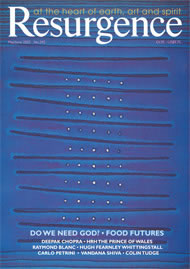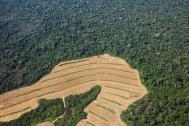MAY 2007 sees the launch of the World Future Council, and our first major book, Surviving the Century: Facing Climate Chaos and Other Global Challenges. The book outlines a road map to a sustainable future in an age increasingly threatened by climate chaos. The eight chapters deal with the politics of climate change, renewable energy, agriculture, rainforests, cities, industrial production systems, trade and democracy. Each chapter offers an impressive vision of a sustainable future. But all of the authors make it clear that we need to make profound, systemic changes to the very basis of our culture, and to the very relationship between humans and nature, if we are to survive this and future centuries.
Climate change is the direct result of the unprecedented combustion of fossil fuels and the reduction of the capacity of the biosphere to deal with the release of waste gases. Both are long-term trends whose impacts are hard to discern. The fact is that in 300 years we will have burned 300 million years’ worth of fossil-fuel deposits, but in the process we have undone much of the natural evolution of life on Earth. Life over many millions of years has played a key role in removing carbon dioxide from the atmosphere, tucking it away deep inside the Earth’s crust. In the last 300 years we have reversed this process. By putting carbon from coal, oil and gas back in the atmosphere in vast quantities, we are changing the very conditions that made life on Earth possible in the first place.
This has been the age of fire, and the more fires we light – in the boilers of our houses, in the engines of our cars, trucks and planes – the faster we change the conditions of life on Earth. Now, we have to deal with the consequences. This means taking urgent action – to wean ourselves off fossil fuels.
In the first chapter of the book, Ross Gelbspan offers a profound insight into the strong resistance of a small elite in the US to face up to the challenges of climate change. Powerful interests are at work, particularly the fossil-energy lobby and its close alliance with the mass media. And this is an issue not just for the US but for all industrialised countries. The systemic dependence of our economies on the combustion of fossil fuels is at the heart of the problem.
Gelbspan advocates significant changes in taxation, subsidies and other fiscal measures. He describes renewable energy as an important tool for reviving local economies, and shows the potential for the climate crisis to become a major transformative opportunity: “The ultimate hope is that a meaningful solution to the climate crisis could potentially be the beginning of a much larger transformation of our social and economic dynamics.”
In the second chapter Hermann Scheer offers a detailed perspective of how such a transformation could be accomplished. As a member of the German Bundestag he has been instrumental in implementing a highly effective renewable energy policy that has been influential worldwide. Scheer’s vision is of a world that weans itself off its dependence on fossil-fuel energy and nuclear power. Unlike these, renewable energy is inexhaustible as long as the solar system exists. The sun supplies our planet with 15,000 times more energy per day than we currently consume. A significant start has been made in the use of renewable energy and, as a result of appropriate legislation, its competitiveness is increasing.
Teddy Goldsmith, founder of Ecologist magazine, presents the case for creating a sustainable food system. Our current food system is totally dependent on fossil fuels – for running farms, producing fertilisers, and transporting food crops by sea, rail, road or air. The agricultural policies of an ever-growing number of countries continue this trend. Recent studies have shown the irresponsibility of modern farming systems from the perspective of energy use. To produce a ton of cereals or vegetables by means of modern agriculture requires six to ten times more energy than by using sustainable
agricultural methods.
This is utterly unsustainable. We could do worse than learn from traditional agricultural practices for the farming systems of the future. The good news is that in many places consumers are encouraging a trend towards local food production for local needs; but legislation is also needed to change the policies of countries and food companies.
For Peter Bunyard, science editor of Ecologist, the future of forests is the primary concern, and much of his time is spent on documenting what is happening to the Amazon rainforest. Significant areas of the Amazon have now been set aside as indigenous reserves and biosphere reservations. But the ecological onslaught continues, and more areas are being made accessible through new road-construction schemes. Timber, gold, tin, iron ore and many other resources are extracted, and conversion of rainforest into cattle ranches and soybean fields, continues with a vengeance.
Bunyard raises the key question of how the continued destruction of the Amazon forest undermines its environmental services to the planet. Deforestation reduces the capacity of forests to absorb carbon, and as a result the Amazon forest has been turned from a net absorber to a net contributor of carbon dioxide. “The relationship between tropical forests and climate must be our first consideration when justifying the need for conservation.” An international process must be developed that values the forest as a natural carbon sink and for its climate services. Fortunately it is becoming clearer that Amazon countries such as Brazil are beginning to realise that the further loss of this vast moisture reserve could damage their own regional economies.
My own chapter on cities and sustainable development further develops these arguments. The bulk of the world’s fossil-fuel energy is burned within or on behalf of cities. The ecological footprints of cities cover much of the globe: they stretch to the most distant farmland and to the remotest forest regions. The important thing now is to reconfigure the way existing cities work. Above all else we need to wean them off systemic dependence on fossil fuels and fulfil their potential as resource-efficient human habitats.
Fortunately, China, the country with the most rapid urbanisation in human history, is starting to take some small steps towards a different future. The Dongtan Eco-City project near Shanghai is pioneering a process of sustainable urbanisation – with the creation of a series of interconnected pedestrian villages powered by the sun, the wind and biomass. Dongtan will have an essentially circular metabolism and will be surrounded by its own agricultural belt to assure a sustainable food supply. By demonstrating a very different way of creating a new city, Dongtan sets a good precedent.
Michael Braungart has a distinguished track record in reinventing industrial production processes. In his chapter he challenges accepted assumptions about the virtues of recycling and demonstrates the critical importance of implementing new, zero-waste production systems. For him the ultimate challenge is to redesign both products and production systems in a process characterised by eco-efficiency, using ‘cradle to cradle’ production, based on natural systems.
Stewart Wallis, in his radical new vision for trade, insists on a similar process of creative transition. Markets are social and political constructs; they are made by people and there is no reason why they can’t be changed by people. The whole system of international trade needs to be re-examined in the light of deteriorating environmental conditions. Wallis formulates a set of criteria for a new trade regime in which sustainable trade is designed to yield positive social and economic as well as environmental benefits. This requires major changes in global governance.
In the final chapter, Frances Moore Lappé starts by emphasising that at present humanity lacks a core concept of democracy that is vital enough to help us resolve the huge problems we are facing. In recent years our leaders have been telling us that they are seeking to spread democracy across the world. But, as currently practised, democracy is a structure of government that is intimately intertwined with the market economy. The key contradiction here is that “democracy presumes the dispersion of power, yet our markets concentrate power.”
But all over the world people are beginning to counter this failing notion of democracy with the new, active notion of ‘living democracy’. This is not an idealistic vision but a very practical process. Living democracy is an enabling tool for righting injustices and dealing with unsolved problems through inclusive decision-making. Global issues such as climate change can only be dealt with by new, participatory global efforts. Thus living democracy “widens the circle of problem-solvers to encompass and engage those most directly affected”.
ALL THE AUTHORS of this book are really saying: let us take our knowledge and endeavour to make a very different world from the one we currently live in. Let us be creative and energetic. Let us be mindful of the needs of future generations. Let us enjoy our lives today while caring for the future. Let us work together to fundamentally change the decisions that are made. Above all else, in an age deeply threatened by climate change, let us realise the enormous potential benefits of a switch towards a sustainable yet modern way of life, not just in industrialised countries, but all over the world.
Surviving the Century: Facing Climate Chaos and Other Global Challenges is published by Earthscan Publications, UK, 2007.








